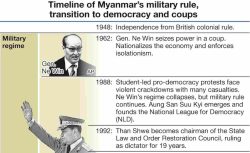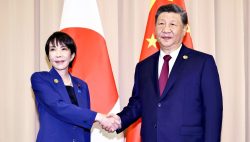16:08 JST, September 14, 2024
The threat of manipulation through the use of disinformation or propaganda to skillfully steer public opinion and the election results of other countries has significantly increased due to advances in information technology. Measures must be taken urgently against such threats.
The U.S. government has imposed sanctions, including an asset freeze, on 10 people and two organizations for interfering with the U.S. presidential election through spreading such things as false information. The editor-in-chief of Russia’s state media network RT and a former agent of the FSB, Russia’s domestic security service, are among the 10 people.
RT reportedly paid a company based in the U.S. state of Tennessee a large sum of money to create videos about illegal immigrants and inflation, which are points of contention in the presidential election. The videos were spread on social media through conservative influencers and others.
The series of manipulation with disinformation is believed to have been aimed at helping former President Donald Trump, the Republican candidate, win the race. Trump does not condemn Russia’s aggression against Ukraine and also holds a negative stance on providing military assistance to Ukraine.
The outcome of the U.S. presidential election will also affect international situations. It is unacceptable for Russia to attempt to distort the voting behavior of the U.S. electorate by illegal means in order to create a favorable situation for Russia.
Russia is alleged to have intervened in the 2016 and 2020 U.S. presidential elections. More recently, the emergence of generative artificial intelligence has made it easier to create fake videos, known as “deepfakes,” making it more difficult to discern their authenticity.
With the internet and social media being more widely used, all kinds of information can now be sent around the world instantly, and thus election intervention has spread beyond the United States.
Before the European Parliament elections in June, allegations came to light that politicians, including those on the far right, from several countries had received money from Russia and made pro-Russian statements. The surge of right-wing forces in the European Parliament elections could have been influenced by Russian maneuvering.
Authoritarian countries such as China and Iran have been accelerating their moves in targeting elections in areas including the United States, Europe and Taiwan.
Japan, too, must be vigilant. House of Representatives and House of Councillors elections will certainly be held either this year or next year. Generative AI has made it possible for anyone to transmit information in Japanese.
To protect its own information space from the intervention of other countries, a nation must counter it with technology. Twenty of the world’s leading information technology companies, including Microsoft Corp. and Google LLC, have decided to study measures across industries to prevent generative AI from being abused for election intervention.
It is reported that they are aiming to develop “digital watermarking” to clearly indicate the origin of videos and improve technology to detect false information on social media. It is hoped that such technology will be put to practical use as early as possible.
(From The Yomiuri Shimbun, Sept. 14, 2024)
Top Articles in Editorial & Columns
-

Myanmar Will Continue Under Military Rule Even After Election, Ex-Ambassador Maruyama Says in Exclusive Interview
-

40 Million Foreign Visitors to Japan: Urgent Measures Should Be Implemented to Tackle Overtourism
-

Expansion of New NISA: Devise Ways to Build up Household Assets
-

China Criticizes Sanae Takaichi, but China Itself Is to Blame for Worsening Relations with Japan
-

Withdrawal from International Organizations: U.S. Makes High-handed Move that Undermines Multilateral Cooperation
JN ACCESS RANKING
-

Univ. in Japan, Tokyo-Based Startup to Develop Satellite for Disaster Prevention Measures, Bears
-

JAL, ANA Cancel Flights During 3-day Holiday Weekend due to Blizzard
-

China Confirmed to Be Operating Drilling Vessel Near Japan-China Median Line
-

China Eyes Rare Earth Foothold in Malaysia to Maintain Dominance, Counter Japan, U.S.
-

Japan Institute to Use Domestic Commercial Optical Lattice Clock to Set Japan Standard Time




















